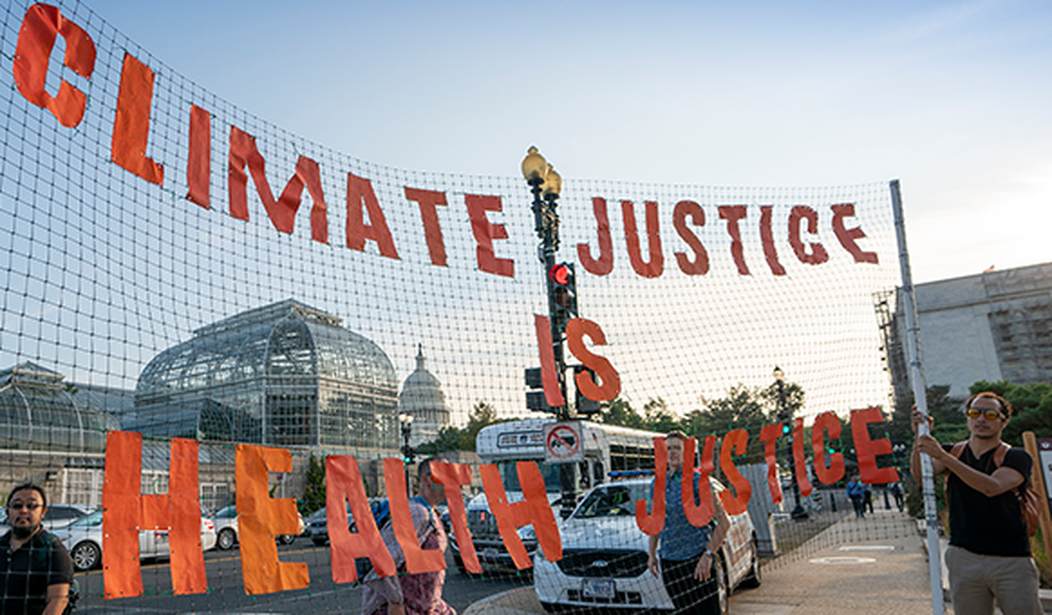Lawfare is becoming quite the pernicious thing. It's pretty much a standard tool of the left, and the intent isn't always to necessarily win their lawsuits brought, but to harass; to make companies, organizations, and governments expend time, human capital, and resources fighting against nonsense lawsuits.
Policy questions, of course (he wrote, belaboring the obvious), should be decided based on logic; on facts, on evidence. That's not how the left does it, of course; with them, it's all about the feels. And, of course, most of the climate scolds and environmentalist nuts, most of whom have never actually been out in the environment, are on the left.
These nonsense lawsuits aren't a new thing. A new article at Climate Realism by Thomas J. Shepstone has compiled an extensive timeline of some of these frauds.
As I noted earlier today, climate lawfare as a whole has gone rather poorly over the last several years, but it continues and studies are being done to support it because it is very effective harassment.
But, how did it start? I wrote it about it here, but my friend Stephen Heins has compiled a wonderful chronology of how it grew from there:
It's a long list and I won't replicate it here. But Mr. Shepstone, in an article from last May, had one such case dissected:
A recent story in the Free Beacon reveals a bit of the corruption inherent in the whole climate con. It’s all about a lawsuit brought on behalf of the State of Hawaii against several oil companies on account of climate change. Curiously, one oil company that donated significantly to Democrat Governor Josh Green somehow got exempted.
Here are a few of the details:
The State of Hawaii filed a major lawsuit against a dozen major oil companies and the nation's largest oil industry group, accusing them of marketing and selling products that have caused higher temperatures, increased sea levels, more frequent flooding, coastal erosion, and more intense heat waves.
But Hawaii's sprawling complaint—which prosecutors hope will force oil industry defendants to pay hundreds of millions of dollars in damages—excluded Houston-based Par Pacific and its subsidiary Par Hawaii, the oil company that operates Hawaii's sole petroleum refinery and remains the state's leading supplier of gasoline and jet fuel…
Uh-huh.
The point is, with these cases, is that many of the actions, investigations, and lawsuits all come to naught. Why?
Because they aren't based on evidence. When and where facts and evidence are required, they lose. And, we should note, they are making some careful exceptions to their lawfare. One hand washes the other, after all.
Read More: Energy Policy Battle Moves to the States
Energy Secretary Chris Wright Predicts Practical Fusion Power in Near Future
I've written volumes about how the evidence, scrupulously examined, doesn't support the claims of the climate scolds. And Mr. Shepstone has piled on, with another study-that-isn't:
Climate lawfare as a whole has gone rather poorly if you believe the point of it all is to win cases. Case after case has been thrown out by courts that have recognized no one is in a position to lay legal blame for climate change. I don’t believe for a second, though, that’s the purpose of the lawfare. I see it as: (1) simple harassment designed to slow down fossil fuel development to make room for green energy grifting, and (2) a technique for motivating the shills for the grifters by equipping them with talking points. A recent study published in Nature (of course) provides an example.
The study is titled “Systematic attribution of heatwaves to the emissions of carbon majors,” and produced the intended headline of “Heatwaves linked to carbon emissions from specific companies.” It is a compendium of academic gobbledegook that largely obscures what the authors are doing, namely, guessing and creating the false impression that we can know just how much Chevron, for instance, contributed to an Oregon heat wave, which is, of course, ludicrous on its face. Clearly, the entire effort here is to lay a foundation for climate lawfare and that is not science.
Now, take careful note of something Mr. Shepstone does here that the scolds, when making their cases online, generally do not: linking directly to the writing he is criticizing. This "see for yourself" approach is key, and it's something you can only do when your audience is 1) people who understand the issue, and 2) people who are interested in seeing the original claim and evidence for themselves.
So, given their track record of failure, why do the scolds keep doing this? Because it's costing the companies, organizations, and even governmental bodies time and money. The scolds' organizations are well-funded, often through some of the very Non-Governmental Organizations (NGOs) which the Trump administration is trying to starve of federal funds. These NGOs are, furthermore, staffed with true believers; money isn't their object. Control is. Businesses are particularly vulnerable to this kind of lawfare, from leftists in government and from NGOs, because they are required to turn a profit.
It's harassment.
So what's the cure? Well, how about a user-pays tort system? That would solve part of the problem: The actual lawsuits, like this idiocy, may well be foiled by the knowledge that if they lost, they are liable for the (millions of dollars) cost to the company they are suing.
As for the politicians spewing subpoenas, many of which are detailed in Mr. Shepstone's extensive list, the cure for that is in the ballot box, and given that many of these nuts are from deep blue states, they may well be something we just have to contend with. For now.















